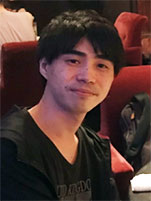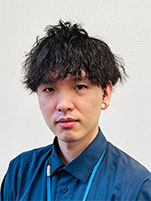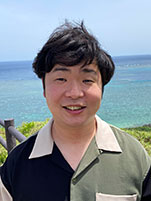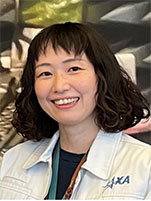Message from OB/OG
- HOME
- Admissions:Message from OB/OG
ONODERA Keisuke
Graduation Year: FY2022
- Research topic of the doctoral thesis: Research on the seismic wave propagation and the internal structure of the Moon and Mars
- Current Position: Earthquake Research Institute, The University of Tokyo (JSPS postdoctoral research fellow)

I would appreciate SOKENDAI for letting me spend a valuable and fruitful time as a Ph.D. candidate. I think the most advantageous point of SOKENDAI is that a student can conduct research under one of the best facilities in Japan with the world-wide renowned professors, who literally lead present space explorations. In my case, I got a chance to join NASA’s InSight mission, which investigated the Martian seismicity and internal structure from 2018 to 2022. Working with the top scientists inspired me a lot and largely impacted my future career vision at that time.
Another important factor for a successful doctoral program is a variety of support from the university (e.g., scholarships, travel expenses, publication fees, and so on). The number of students is so small that the university staff kindly and appropriately deal with every one of requests and/or office procedures. I’m sure their thorough supports enable you to fully focus on your research project.
On the other side, I felt that SOKENDAI strongly requested us to do research independently compared to other universities. Despite a busy schedule, professors may squeeze time for discussion with you. Yet, you had better not expect that they teach you something from A to Z. In my personal opinion, SOKENDAI is suitable for you if you think you can do research alone as long as you have access to the necessary facilities. The doctoral program is full of challenges and difficulties with a handful of joys. But, after overcoming those, you will feel more confident and get closer to whatever you want to be.
Currently, I continue my research as a profession at Earthquake Research Institute of The University of Tokyo. Thanks to some experience at SOKENDAI, I can handle various types of requests from JAXA’s or NASA’s space project team without any problem and actively conduct research projects with foreign researchers. In the future, I would like to make a big contribution to planetary science by promoting research in seismology on various planetary bodies.
KARIYA Kazuki
Graduation Year: FY2019
- Research theme at graduate school: Research on autonomous terrain relative imagery navigation for spacecraft in resource-constrained environments
- Current position: Space Exploration System Technology Unit, JAXA Space Exploration Center (JSEC), Japan Aerospace Exploration Agency

The student life at ISAS offers a rich environment that cannot be found in other universities, including opportunities to be involved in space development projects, research facilities for realizing such projects, and guidance from experienced professors. Students can be involved in rocket launches and satellite operations, while receiving strong support for their research themes, which are the real issues in actual space development.
I myself was involved in a lunar lander project after entering SOKENDAI, and focused my research on future spacecraft navigation technology using image processing, as an extension of the problems I learned there. I am now working for JAXA, where I am involved in future lunar exploration and utilization. I am also working together with the project members who helped me at SOKENDAI.
If you are attracted by such opportunities and attractions, SOKENDAI's Space and Astronautical Science will give you the best environment.
MANDO Yuki
Graduation Year: FY2019
- Research theme of the graduate school: Research on electrical phenomena caused by ultrafast collisions of space debris.
- Current position: Research Institute, Mitsubishi Heavy Industries, Ltd.

I wanted to do cutting-edge research related to space, which is why I enrolled SOKENDAI, which has ISAS on its campus. ISAS is blessed to have one of the best research facilities in Japan that simulates the space environment, attracting researchers and students from various fields of expertise, both domestic and international. I believe that the most attractive point of this university is that a small number of elite students can receive direct supervision from ISAS professors with a wealth of project experience in such a favorable environment.
In addition, SOKENDAI offers various other unique programs (in my case, participation in the launch of the Epsilon launch vehicle, organizing seminar at the Nobeyama Radio Observatory, etc.), and if students are self-motivated and proactive, they can receive generous financial support, which is a good thing for me.
During my school years, I engaged in research activities related to wireless power transmission and space debris control in the laboratory of Koji Tanaka, a leader in the field of space photovoltaics, and in educational activities to share these studies with school kids. Through these activities, I have come to believe that in order to further develop the space field, it is important to expand the base of the space industry and make space more accessible to the public, and I am currently working in the aerospace field as a researcher at MHI's Research Laboratory.
HAZE Kanae
Graduation Year: FY2011
- Research theme at graduate school: Development of binary shaped pupil mask coronagraph for the observation of exoplanets (thesis)
- Current position: Space Technology Directorate I, Japan Aerospace Exploration Agency

I entered SOKENDAI because I wanted to do research at ISAS, which handles all aspects of space telescope development, operation, and observation. In this dreamlike environment, where I was surrounded by researchers, I was able to work hands-on for five years on the research I wanted to do (research and development of a coronagraphic optical system for direct observation of exoplanets to be installed in a next-generation telescope). The ISAS professors' classes were based on their own experience in spacecraft development and operation, so I was able to learn in depth, and I was also able to learn technical writing necessary for writing papers and proposals for research grants through practice from an early stage. I had the opportunity to experience satellite operations and data analysis in my laboratory, and it was a very fulfilling student life. As with research, there was a free atmosphere for outreach activities in which you can make use of your own ideas. We planned and published a booklet at an occasion of ISAS’s open day. As SOKENDAI students, what you gain from ISAS is different for everyone, so please take advantage of this wonderful environment and enjoy the different views.


